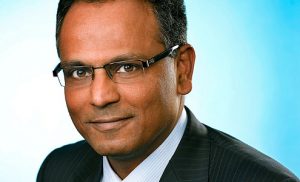 “I’m Rajiv Jain. I bought my first stock in high school and have been managing other people’s money for over 23 years.” So says Jain, the proud co-founder of GQG Partners in sunny Fort Lauderdale. Jain is the former star emerging markets fund manager for Vontobel Asset Management, one of the biggest emerging market funds in the U.S. with $48 billion under management. GQG Partners is a new boutique investment firm that taps Jain’s expertise on global equities, and caters to a small, VIP crowd of institutional investors.
“I’m Rajiv Jain. I bought my first stock in high school and have been managing other people’s money for over 23 years.” So says Jain, the proud co-founder of GQG Partners in sunny Fort Lauderdale. Jain is the former star emerging markets fund manager for Vontobel Asset Management, one of the biggest emerging market funds in the U.S. with $48 billion under management. GQG Partners is a new boutique investment firm that taps Jain’s expertise on global equities, and caters to a small, VIP crowd of institutional investors.
When Jain left Vontobel, the company’s shares fell 11% on the news. He managed the $9.4 billion Virtus Emerging Markets Opportunities Fund (HEMZX 6,94 +0,01 +0,14%), which beat 99% of its peers over the last five years according to Bloomberg. Morningstar rated it five stars and between January 2, 2009 to March 1, 2016, the month he left the fund, total return on Virtus was 79%. MSCI Emerging Markets was up 30.6% by comparison. Jain left to build his own fund firm.
Launched last summer, GQG has around $1.3 billion with a confirmed pipeline of unfunded mandates that just might double that number this month. GQG is mainly managing endowment and pension fund money. They run a mutual fund branded under Goldman, called the Goldman Sachs International Opportunity Fund (GSIMX 22,51 +0,04 +0,18%). Last month, they launched their first self-branded fund, the Global Quality Growth (yes, that is what GQG stands for) Emerging Markets Fund (GQGIX 17,49 +0,11 +0,63%). Rajiv runs the fund with co-founder, Tim Carver, former CEO of Pacifica.
“I want to buy global brand name companies with durable franchises and sustainable long term growth,” he says, adding that he is focusing on a five year time horizon. Jain’s also benchmark agnostic at GQG.
Here are some of this thoughts on the biggest markets in the world today:
Fed rate hike: winners and losers?
“Interest rates are beginning to go higher already, just look at the inflation picture. The real trade in all of this is going to be sector rotation because as interest rates go up I’m going to want to sell the names that have been beneficiaries of low rates. And you have to be ultra careful with these bond-proxy names, like the stable dividend stocks,” he says. “That’s going to be like Chinese water torture.”
Europe?
“Watch the job market, not just politics. It’s improving,” he says.
Brazil
Brazil is the best performing big emerging market. Brazil equities in dollars, as measured by the iShares MSCI Brazil (EWZ 31,83 -0,59 -1,82%) are clobbering the S&P 500 this year as well.
“Our exposure was 6% and now it’s 14%. I’m not liking consumer staples there. Look at beer companies like AmBev (ABEV 2,42 -0,06 -2,42%), they have tremendous margin pressure because like a lot of consumer companies they have been focused on margin and not growing their underlying businesses. Banks,” he says. “They’re attractive. There is a lot of pent up demand and they will surely respond well to lowering interest rates there.”
China
“The only thing I like in China right now are the internet names, and also China Mobile (CHL 27,51 0,00 0,00%) because of capex going down,” he says. “That means more cash for them to turn into dividends. They can easily increase the payout. China Mobile is a free cash flow story,” he says.
CHL dividend yield is currently 4.83%. Oh, and hard landing? Forget it.
“People get too caught up in that story,” he says. “It’s not a Western system. The government owns a lot. A hard landing means a collapse to me and a collapse means the Communist Party is out. I don’t think they are about to let that happen.”

